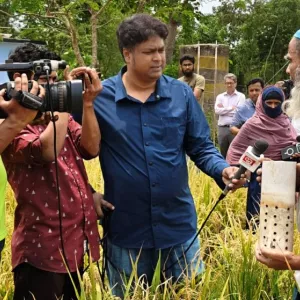ADB initiative promotes water-saving irrigation practice in drought-prone Bangladesh region
In a push to promote sustainable agriculture and combat groundwater depletion in Bangladesh’s drought-prone Barind region, the Asian Development Bank (ADB) has launched a pilot project to encourage the adoption of Alternate Wetting and Drying (AWD) irrigation practices among local farmers. The Barind area, located in the country’s northwestern region, faces chronic water scarcity due to low rainfall and

ADB initiative promotes water-saving irrigation practice in drought-prone Bangladesh region

In a push to promote sustainable agriculture and combat groundwater depletion in Bangladesh’s drought-prone Barind region, the Asian Development Bank (ADB) has launched a pilot project to encourage the adoption of Alternate Wetting and Drying (AWD) irrigation practices among local farmers.
The Barind area, located in the country’s northwestern region, faces chronic water scarcity due to low rainfall and poor aquifer conditions. Groundwater is heavily relied upon for dry-season rice cultivation, raising concerns about the long-term viability of farming in the area.
To address this challenge, ADB, in collaboration with several national and international partners, has initiated a study involving 1,000 farmers in Niamatpur Upazila of Naogaon District during the 2024–2025 Bboro season. Project partners include the International Rice Research Institute (IRRI), Bangladesh Rice Research Institute (BRRI), DASCOH Foundation, Nippon Koei, Nodes Digital, and Pabna University of Science and Technology (PUST).
AWD is a scientifically proven irrigation technique that can reduce water usage by up to 20% and lower greenhouse gas (GHG) emissions by 30%, without compromising crop yields. Despite being introduced in Bangladesh in 2004, the adoption of AWD has remained limited. The current initiative aims to bridge this gap by providing technical support, capacity building, and data-driven validation of the technology’s benefits.
IRRI is leading the technical aspects of the project, supporting farmers and partners in implementing AWD while monitoring water dynamics, GHG emissions, and socio-economic factors that influence adoption. In partnership with BRRI, IRRI also collects data to explore potential carbon credit opportunities linked to AWD usage.
Nodes Digital and PUST have deployed Internet of Things (IoT)-based water sensors and automatic GHG measurement devices to enhance data collection. These are being cross-referenced with manual measurements to validate their accuracy and support wider application of smart…

